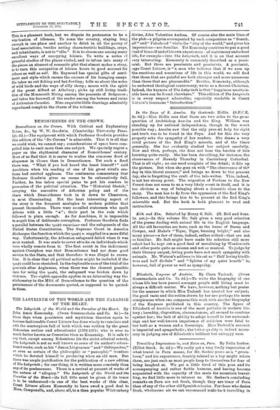In the Days of 8. Anselm. By Gertrude Hollis. (S.P.C.K.
2s. 6d.)—Miss Hollis sees that there are two sides to the great question of Archbishop Anselm and the King. William was standing up for national independence, though in the worst possible way ; Anselm saw that the only present help for right and truth was to be found in the Pope. And for this she very properly asks the sympathy of her readers. She draws a very vivid picture of the Red King's misrule, and of the times generally. She has evidently studied her subject carefully. Now and then, perhaps, she does not bear the burden of this learning quite easily. She has been describing, for instance, the observances of Maundy Thursday in Canterbury Cathedral. That is all right ; no one need complain of the detail; it fills up the picture. But when she goes on with "The observance of the day in this literal manner," and brings us down to the present day, she is forgetting 'the craft of the tale-writer. This, indeed, is not her strong point. The migration of Purkess to the New Forest does not seem to us a very likely event in itself, and it is too obvious a way of bringing about a dramatic close to the story. The man has to fly from the oppression of the Red King's followers, and this brings him to be present at the Red King's miserable end. But the book is both pleasant to read and instructive.


























































 Previous page
Previous page